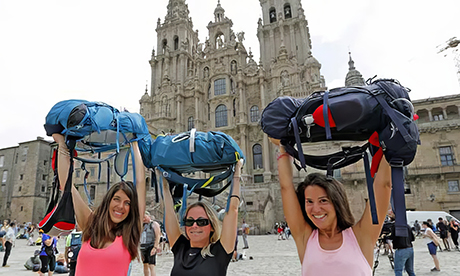The highly popular pilgrimage centre of Santiago de Compostela is struggling with an influx of pilgrims.
The influx is sparking concerns among locals about respect and preservation of their community.
Roberto Almuina, 73, chairman of the 600-member residents’ association, voices these concerns: “We don’t have the slightest problem sharing our city with visitors. The only thing we ask for is respect.”
Every day, around 1,500 pilgrims arrive on foot or by bike, alongside other tourists and day-trippers who come by bus or cruise ship.
This surge leads to congested streets and noise pollution, with city guides using loudspeakers, despite regulations.
Videos on social media show groups of pilgrims entering Santiago de Compostela, often singing and shouting.
“This has to stop” one resident is heard saying in a video.
Almuina describes the situation as “unbearable” and criticises the large groups blocking the narrow streets of the old town.
“Groups of 40 people in six-metre-wide streets in the old town are not welcome” he exclaims.
Cyclists navigating through the historic centre and littering in the cathedral square are also major issues.
“This isn’t a picnic area or a beach on the Mediterranean. This no longer seems normal to me. I don’t do that myself when I’m in a foreign city” Almuina adds.
Fragile Santiago campaign
The residents’ association seeks dialogue with local authorities instead of protesting.
Almuina suggests setting up information centres at key city entrances to inform visitors about proper behaviour.
The guidelines are often overlooked – despite the existing “Fragile Santiago” campaign which advises pilgrims to avoid noise and refrain from using walking sticks that cause pavement damage.
Almuina also proposes a tax on day-trippers to cover waste disposal costs, arguing that pilgrims should not be exempt from such fees.
Many popular tourist destinations have already implemented such a tax.
Mass tourism is likely to keep the city busy in the future.
Last year, 446,077 pilgrims received their diplomas in Santiago de Compostela, setting a record.
By mid-July 2024, the pilgrims’ office reported a 15% increase over the previous year.
Sources
